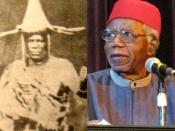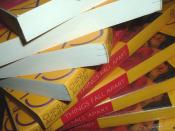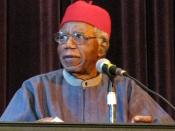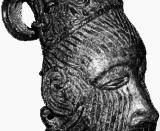The tragic story of Okonkwo in Chinua Achebe's, Things Fall Apart, exposes many examples of the Igbo clan's beliefs. According to the text, the Igbo believed in fate; that nothing happened by chance, but were results of Chukwu or God's will. In this story, what lead to Okonkwo's downfall in life was not because he was a victim of fate, but because this was a harsh result of his tenacious actions and decisions.
Growing up on his own two feet, with no support from his worthless father, Okonkwo became a very stern, but successful man that stuck to his word- "ÃÂone would think he never sucked at his mother's breast'(Achebe 23). He hated his father so much, it grudged on him for the rest of his life. Anything he saw weak or invalid, was ultimately loathed by him. Okonkwo is, no doubt, a very strong and hard working man, very prideful, yet very stubborn.
For three years he had to take care of Ikemefuna, but during that time, he found that he grew a bound with the boy. He noticed how this boy was so much like him, even better than his own son. Though, when the clans men came to take away Ikemefuna, Okonkwo was warned not to go, but he refuses to obey. Once Ikemefuna is beaten half to death, he crawls to Okonkwo pleading for his help, calling him father. Seeing a great sign of weakness and resembling the trait of his own father, Okonkwo gives the boy a final blow with his machete. He didn't have to watch this boy get killed, but his conscience was filled with obstinacy. He is known to be fearless, yet ironically he fears to be afraid to watch Ikemfuna die. As seen here, this is an act of his own decision.
According to the Igbo tradition, it may be either destiny or retribution for his sins that brings about the downfall and banishment of Okonkwo and his family. When Ogbuefi Ezuedu passed away, the tribe proposed a funeral celebration which Okonkwo was warned not to go to. Although, as one of the most significant people of the tribe, driven by pride, he felt it was his decision whether or not to go, and once again he fails to heed the premonition. He brings along his rifle, a weapon he hardly even knows how to use. As the ceremony begins to get wild, all of a sudden his rifle explodes and a scrap of metal slashes through "ÃÂthe dead man's sixteen-year-old son, who with his brothers and half-brothers had been dancing the traditional farewell to their father'(Achebe 105). The clan considers it an accident, but as a consequence, Okonkwo, has "ÃÂpolluted the land with the blood of another clans man'(Achebe 106). Due to this unfortunate mishap he and his family were exiled to his mother's homeland for seven years, while all his material possessions were left behind to be destroyed. Had he not chosen to go, none of this would have happened. This has illustrated one of Okonkwo's strongest traits, vanity.
The Igbo tribe believed when a man says yes, his personal god or "ÃÂchi' would say yes too. The narrator states: "ÃÂOkonkwo said yes very strongly; so his chi agreed'(Achebe 23). Of course, this is just another one of those Igbo theories. In the end, Okonkwo finds his chi has turned against him. The arrival of the white-man corrupted the Igbo society and all of their cultural traditions. Okonkwo tries to stop all this havoc by forceful ultimatum, but it was too late. The white-man's religion has already gotten into the minds of the people. None the less, Okonkwo finds himself cornered by a force that grew so inevitably. As a result, he makes the only decision that he, as a man, rightfully has the power to choose; to live or to die. Honorably, he takes his life. In our society, to commit suicide is a terrible sin, but for Okonkwo's situation, this is a different matter. Whether Okonkwo decided to kill him-self or not, his life would have been taken by the white-man anyway. The significance of his suicide was an illustration of his bravery. It was best that he made this move before they took away his only decision in life. At least now, in the thoughtful minds of the people, he may die with honor. Proudly, he died upon his own decision and not from someone else's. He died for what was right and he died not a coward. The people will treat his death with great reverence. Had he not made this correct choice, indeed he would have been killed, but his people would have thought him as a failure and he'd lose all respect, which in the end, we find that he is not.
One may attempt to hypothesize that Okonkwo's plight was a result of bad luck. There is no such thing as luck nor is there such thing of fate. All that has happened in the life of Okonkwo are results of his own free-will. Nothing happens by chance and anything thought to be "ÃÂwyrd' always has a logical explanation. Everything that Okonkwo reacts to is all based on his attitude and the way he sees things. Since he factors the way he sees people into two categories: 1) the strong and well rounded, and 2) his father and everything that resembles "ÃÂhim'; might have Unoka been a hard working role model for his son, the life of Onkonkwo would have positively been changed. Who knows? Then again, even if Unoka stayed the same, it would still be Okonkwo's choice to change the negativity of how he views things into a broader aspect. It's like the saying goes, "ÃÂpeople don't cause us to be angry, it's our choice whether we want them to or not'.





